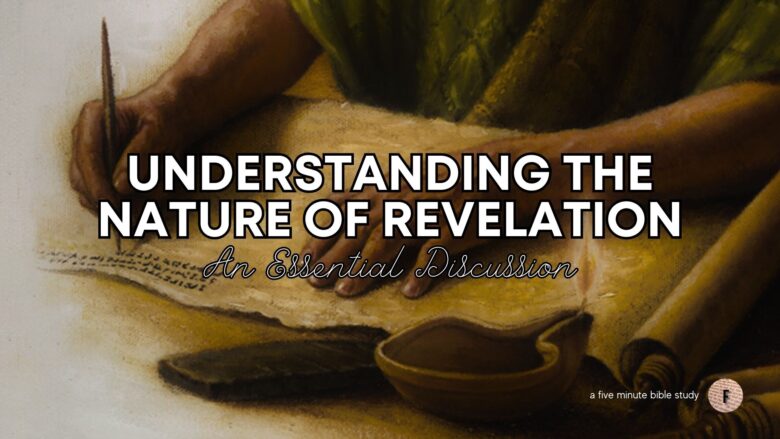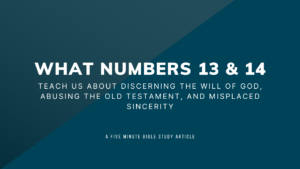Before reading this article, I would highly encourage you to go back and read The Naked Truth About the Truth first. Once we agree that truth is constant, exclusive, and doesn’t care about our feelings, the foundation has been laid to discuss the nature of revelation. By “revelation” I am not specifically referring to the last of the 27 New Testament books but to the concept of God revealing Himself to mankind generally. It is in the written words of God that truth is revealed to us (Jn. 17:17). Few Christians would disagree with the last sentence statement, but it is my observation that not all Christians have considered what all is implied by the fact that God has revealed His truth in the written word. When I hear Christians make seemingly arbitrary statements such as, “That (biblical doctrine or text) isn’t essential,” I sense there is confusion about the nature of revelation and truth. In this article, I want to establish what revelation is and why this has a tremendous effect on how we perceive the Christian’s ability to understand the truth of scripture.
What Is Revelation?
When a boy doesn’t want his parents to know what he made on the math test, he might cover it up by telling a white lie. On the other hand, when a boy wants to let his girlfriend know that he deeply cares about her, he reveals it by saying, “I love you.” When God wanted to make His will known to mankind He likewise revealed it to His prophets who spoke it and subsequently wrote it down. This process is described very nicely in Ephesians 3:3-5— “… by revelation [God] made known to me the mystery (as I have briefly written already, by which, when you read, you may understand my knowledge in the mystery of Christ), which in other ages was not made known to the sons of men, as it has now been revealed by the Spirit to His holy apostles and prophets…” Revelation is the uncovering of truth, the making known of things formerly unknown, the sharing of knowledge so that others can understand.
That’s what revelation is. With that established, there are certain truths about revelation that you should know.
1. Revelation Is Complete
Progressive revelation is a phrase used to describe God’s revelation during those days that the scriptures were being written down. God revealed Himself primarily and progressively through the prophets (Amos 3:7; 2 Chron. 36:15-16); this started with Moses and ended with the apostle John. By the end of the 1st century, the last words of God’s revelation were written down. Notice three passages that speak to God’s revelation being completed. Jude says, “I found it necessary to write to you exhorting you to contend earnestly for the faith which was once for all delivered to the saints” (v. 3). In Ephesians 4, Paul says that God revealed “the faith” (God’s body of faith/believing/doctrine) by the means of miraculous gifts which were endowed, “till we all come to the unity of the faith and of the knowledge of the Son of God, to a perfect man, to the measure of the stature of the fullness of Christ,” (v. 13). This implies the progressive nature of God’s revelation, but it also explicitly says that there would be a point in time when that revelation was completed. As previously stated, I believe that time came when the last words of scripture were completed. Paul elaborates on this further in 1 Cor. 13, “When that which is [complete] has come, then that which is in part will be done away,” (v. 10). Contextually, Paul is speaking about revelation and saying, “When God’s written revelation is completed, then God will do away with spiritual gifts that revealed only parts of His word here and there to different men.” Jude v. 3, Ephesians 4, and 1 Corinthians 13 reveal that God’s revelation is completed in the church age. While revelation was progressive at one time, it is completed now.
2. Revelation Is Understandable
Going back to the definition I established up front, revelation uncovers, makes known, and reveals knowledge. If this definition is true, then we can know what God has revealed. That is to say, we can understand God’s word as far as it has been revealed (Deut. 29:29; John 20:30-31). Two statements of Jesus when read together confirm this as fact. In John 8:32 He says, “You shall know the truth.” In John 17:17 He says, “Sanctify [my disciples] by Your truth, Your word is truth.” These statements teach us that God’s word reveals His truth, and that man can, in fact, know it. Repeating Paul: “When you read, you may understand…” (Eph. 3:4). That’s right. When you read the revealed word of God, you can understand it. How is this possible that we can understand an infinite God? God created your intellect. He gave you mental faculties with the ability to process and understand what He wrote. Furthermore, as transcendent as God is, our omnipotent God has the ability to effectively come down to our level of understanding. To speak of God’s word as if it cannot be understood or to assert that God’s word requires supernatural aid (further revelation) to understand it does four things: (1) contradicts scripture (2 Tim. 3:16-17), (2) contradicts the meaning of revelation (to reveal; not conceal), (3) undermines God’s judiciousness in revealing Himself through writing, and (4) undermines God’s ability to reveal Himself simply enough for human understanding.1
To be clear, I am not saying any of the following: God’s revelation (written word) is always easy to understand; God’s revelation reveals everything there is to know about everything; I (Aaron) know all truth revealed in scripture; I (Aaron) will know all truth revealed in scripture before I die. What I am saying is that God’s revelation (written word) “has given to us all things that pertain to life and godliness through the knowledge of Him who called us by glory and virtue” (2 Peter 1:3). Everything we need to know is revealed in scripture, and we can know everything we need to know, as far as it is revealed in scripture. For example, there are many things about the nature of God we cannot know, because it’s not fully revealed in scripture, but that’s not to say that we can’t know anything about the nature of God. Whatever is revealed in scripture about God’s nature, we can actually know. Another example, we may not know everything about the nature of heaven, because heaven is not fully revealed in scripture, but that’s not to say that we can’t know anything about heaven. Whatever is revealed about the nature of heaven in scripture, we can actually know. Assuming God put everything in the scriptures for a good reason, God doesn’t waste His breath, and we can know things as far as they are revealed in the scriptures, we must assume that God expects us to seek the knowledge of all things that are revealed in His word. Paul’s prayer for the Colossian Christians is a fitting prayer for all Christians today: “Be filled with the knowledge of His will in all wisdom and spiritual understanding; that you may walk worthy of the Lord, fully pleasing Him, being fruitful in every good work and increasing in the knowledge of God…” (Col. 1:9-10).
3. Difficult Revelation Is Still Revelation
What should take place is not always what does take place. We should increase in our understanding of God’s word every day, but that doesn’t always happen. The difficult parts of the Bible slow us down. The book of Revelation is difficult. The subject of marriage, divorce, and remarriage is difficult. What the Bible says about grace, faith, and works is difficult. The Holy Spirit admits that the Bible is difficult at times. “Paul, according to the wisdom given to him, has written to you… in which are some things hard to understand, which untaught and unstable people twist to their own destruction, as they do also the rest of the Scriptures” (2 Peter 3:15-16). What we must understand from this passage about God’s revelation is that difficult revelation is still revelation. What I mean by this is: revelation reveals, it doesn’t conceal. Peter said that some of Paul’s writings are hard to understand… but they can be understood. In that day, some people had misinterpreted Paul’s writings and the Scriptures in general. The practice of misinterpreting and mishandling the word of God was not chalked up to novelty and insightfulness that was worthy of consideration. No. Peter said this misuse of God’s word leads to destruction.
Sometimes we get into discussions with brothers and sisters in Christ on difficult Bible subjects or texts. If you have lived very long, you know that those discussions do not always end in agreement. As a result of the disagreement that ensues, it’s tempting to seek resolution by saying, “This is a very difficult subject.” This response is sometimes stated so as to imply, “This can’t be understood, and so, we will never come to agreement on it.” If the disagreement is regarding something not revealed in scripture, that answer would be appropriate, but if the disagreement regards something that is revealed in scripture, then this answer contradicts everything we have learned to this point (revelation reveals, revelation is understandable, and we can know the truth as far as it is revealed).
It is important that we refrain from labeling God’s revelation as too difficult to understand in these situations. It’s also important that we avoid what Jody Apple terms hermeneutical agnosticism. “As it is applied to hermeneutics,2 agnosticism affirms that we cannot know that any given meaning or interpretation of the Bible is true” (23-24).3 While few people come right out and say, “We can’t know any interpretation of the Bible to be absolutely true,” there are common sayings that imply as much. “That’s just your interpretation,” is one such common saying. “You shouldn’t insist on your interpretation being right. After all, you could be wrong,” is another common saying. These type responses leave the impression that any one interpretation of scripture is as good as another, we can never really know if our interpretation is definitely true, and because of this, we should never speak in such a way as to imply that others might possibly be wrong. This opens up a humongous can of worms, that, when opened, are difficult to get back in the can.
Conclusion
Hopefully, at this point, you have a better handle on the nature of revelation, and you can start seeing why this is an important discussion to be had. This topic is foundational to the acceptance of Jesus’ words, “You shall know the truth, and the truth shall set you free” (Jn. 8:32). What we believe about this subject directly affects the veracity of those words. In this study we learned what revelation is, that there is no continuous revelation ongoing today, God’s revelation can be understood, and difficult revelation is no exception to this rule of understanding. We observed some things people say in an effort to avoid disagreement and get around these facts. One common get-around saying that we did not observe is, “This isn’t a salvation issue.” It is not uncommon to hear this response brought up when brethren disagree on scripture. In the next article, we will pursue this rebuttal further. Until then, let be increasing in “the unity of the faith and the knowledge of the Son of God to a [complete] man… that we should not longer be children, tossed to a fro and caried about with every wind of doctrine” (Eph. 4:13-14).
1 These facts are contrary to popular belief. Steve Gregg stands as a fair representative for the opposing viewpoint. “For the message [of the gospel] to strike the heart with power, assurance, and the Holy Spirit, more is required than the mere transmission of information. It demands the power of the Holy Spirit operating through a Spirit-filled disciple of Jesus.” Gregg, Steve. Empire of the Risen Son: A Treatise on the Kingdom of God—What It Is and Why It Matters, Book One: There Is Another King. E-book, Maitland, Xulon Press, 2020, p. 98-99.
2 Hermeneutics is a fancy word for “methods of interpretation.” In this context, hermeneutics refers to interpretation methods used in studying the Bible.
3 Apple, Jody L. Hermeneutical Agnosticism: A Critique of Subjectivism in Biblical Interpretation. Media, New Testament Christian Press, 1985.



